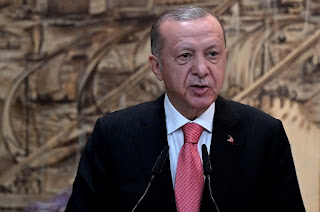
"Tasnim": Assad and Erdogan may meet at the Shanghai summit in Uzbekistan
The Iranian "Tasnim" news agency reported, quoting informed sources, that Turkish President Recep Tayyip Erdogan and Syrian President Bashar al-Assad "may meet at the Shanghai Cooperation Organization summit, which is expected to be held next September in Uzbekistan."
The agency quoted the sources as saying that Russian President Vladimir Putin "invited Erdogan to participate in the meeting of the Shanghai Cooperation Organization in Uzbekistan, and Putin also asked Assad to participate in this meeting."
Earlier, Erdogan said that his Russian counterpart, Vladimir Putin, invited him to attend the summit meeting of the Shanghai Cooperation Organization in Uzbekistan in September.
Meanwhile, Turkish media revealed that President Erdogan and his Syrian counterpart, Bashar al-Assad, may hold a phone call, during the coming period, at the suggestion of Putin.
In the context of the Turkish-Syrian rapprochement, the agency indicated that the leader of the Turkish "Homeland" party, Dogu Perincek, "will soon head to Syria as part of a political and diplomatic delegation, where he will meet and hold talks with Syrian President Bashar al-Assad."
She added, "Berncik will be accompanied on this trip by a number of former ministers and veterans of Turkish diplomacy, and a report on the results of this trip will be submitted to the Turkish authorities."
In this context, it was pointed out that the Turkish delegation's trip to Syria will be the first from a Turkish airport to Damascus in about 10 years, as direct flights between the two countries have not been operated since 2011.
The Iranian agency stated that "the focus of this trip will be on ways to restore relations, the joint struggle against terrorism in northern Syria, and the return of Syrian refugees," as it put it.
It is noteworthy that the Kremlin announced on August 9 that the two Russian Presidents, Vladimir Putin, and his Turkish counterpart, Recep Tayyip Erdogan, discussed the situation in Syria.
It is noteworthy that the regular summit of the leaders of the Shanghai Cooperation Organization will be held next September in the city of Samarkand in Uzbekistan, which is currently the head of the organization.
Mevlut Cavusoglu : A dialogue is taking place between the Syrian and Turkish intelligence services
Today, Tuesday, Turkish Foreign Minister Mevlut Cavusoglu said that "there is a dialogue taking place between the Syrian and Turkish intelligence services."
Cavusoglu stressed that "Turkey does not have preconditions for dialogue with Syria," noting that "dialogue with the Syrian government must have specific goals."
The Turkish minister said: "A meeting was not planned between the Turkish and Syrian presidents in Shanghai, because Assad will not participate in the summit," as he put it.
Earlier today, the Iranian "Tasnim" news agency reported that Turkish President Recep Tayyip Erdogan and Syrian President Bashar al-Assad "may meet at the Shanghai Cooperation Organization summit, which is expected to be held next September in Uzbekistan."
The agency quoted sources as saying that Russian President Vladimir Putin "invited Erdogan to participate in the meeting of the Shanghai Cooperation Organization in Uzbekistan, and Putin also asked Assad to participate in this meeting."
It is noteworthy that the regular summit of the leaders of the Shanghai Cooperation Organization will be held next September in the city of Samarkand in Uzbekistan, which is currently the head of the organization.
































































